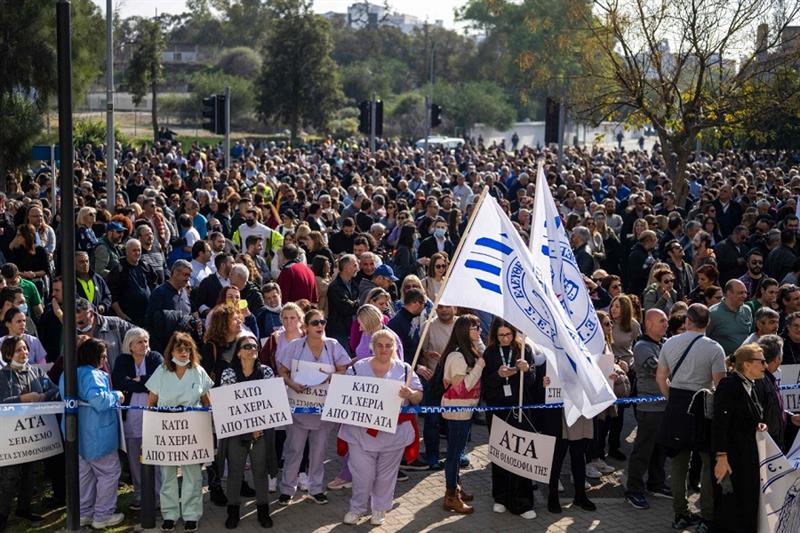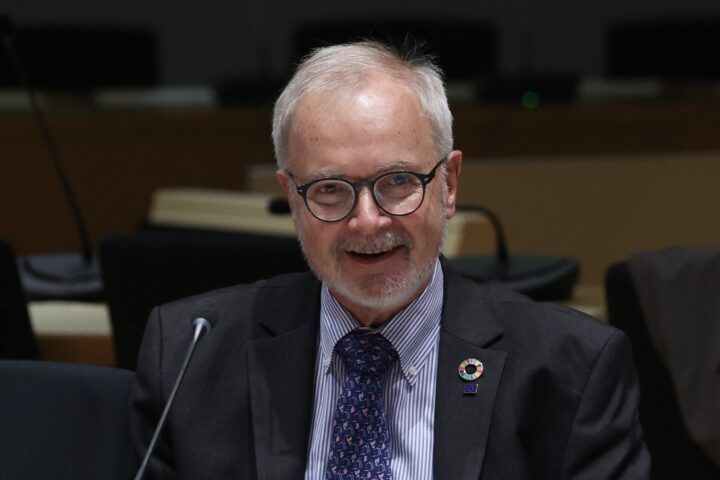President-elect Nikos Christodoulides will have his hands full trying to keep the peace among social partners, as trade unions are pressing for remedies to incomes under threat.
With the restoration of the Cost of Living Allowance topping the list of demands, unions called a general strike just two weeks before the first round of the election on 5 February to exert pressure on the government.
Christodoulides is optimistic that the majority of pending labour issues will be resolved in March when he comes to office.
At a meeting with DISY-affiliated trade union federation SEK, the President-elect said he was eager to “begin finding solutions” even before officially assuming office on 1 March.
The meeting with the trade union was one of the first things Christodoulides did after winning the Presidential elections.
SEK had openly supported Christodoulides in the second round of the election.
“We will have results; we will reach a conclusion on important labour issues,” Said Christodoulides, reaffirming his commitment.
However, on the other side of the political spectrum, the opposition AKEL-affiliated PEO trade union federation is wary of the new president’s intentions.
Talking to the Financial Mirror, PEO general secretary Sotiroula Charalambous said: “The President-elect will need to prioritise a number of ageing issues which are key to maintaining labour peace and restoring the lost purchasing power of the lower-income class.”
Charalambous said the working class had lost a big chunk of its purchasing power as inflation continued to rise for more than a year.
She reminded that the annual inflation rate in January was 7.1%, continuing the deceleration path for the third consecutive month, while the number of unemployed rose 8.6%.
The annual inflation rate slowed to 7.1% from 7.9% in December.
“Going to buy groceries and buying fuel has become a nightmare for people.”
The largest price changes when compared to the index of January 2022 were in electricity, up 35.6% and industrial goods (excl. petroleum products) with 8.3%.
“The best remedy for this would be to restore the Cost of Living Allowance to levels before the 2013 crisis when it was slashed”.
Charalambous argued that restoring CoLA is vital for the working class, “an issue that can no longer remain on ice.”
She said that PEO has already requested to meet Christodoulides, which is pending.
“We would like to see the new president take action in March”.
Christodoulides has put forward a formula for partially restoring CoLA to restore part of the purchasing power of employees without jeopardising the viability of businesses.
He believes the restoration and performance of CoLA should be carried out within a timeframe that takes into account the course of the economy.
In his manifesto, Christodoulides said that CoLA for the public sector should be granted in stages, reaching a rate of 70% to the low-wage earners in the A2-A5-A7 scales and 30 % in the higher pay scales.
“The next hot topic is forming a national strategy for employing workers from third countries.
“Our main concern is that employers will use the labour shortage as a pretext to encroach on workers’ rights,” said PEO’s leader.
Especially in the hospitality sector, labour shortages are felt, with hoteliers lobbying the government to soften regulations in recruiting foreign workers.
“We fear that this could be used to erode workers’ rights and bypass collective agreements signed between social partners in the sector.”
Pensions
The unions have also been campaigning for abolishing a 12% penalty clause imposed on people who retire early at 63.
The outgoing government had been working towards striking a happy balance between labour union demands to scrap the 12% penalty clause imposed on people who retire at 63.
The late Labour Minister Zeta Emilianidou had been working on a formula to gradually eliminate the penalty.
“Unfortunately, we have reasons to doubt the new government’s intentions to continue working towards resolving the matter,” argued Charalambous.
The government set the age of normal retirement in 2012 at 65, with legal provisions included so that for each month someone opts to collect their pension earlier, the pension is reduced by 0.5% for every month.
“The new government also must address discrepancies in the law governing pensions, as people who work past age 63 are not entitled to sickness benefits if they become ill or injured.
“Therefore, they are essentially forced, should they get sick, to retire early without wanting to, having to accept the early retirement penalty”.










